An intricate juggling act
With resumption of in-person school, students struggle to balance academic pressure with individual interests, needs
Jess Holtz, Emily Garza, Anna Bausman, Leah Gordon and their classmates work through an anatomy lab on Sept. 29.
December 17, 2021
With nearly eight hours of school five days a week, the schedule of a high school student can be likened to a full-time job. When you consider students who engage in after-school activities, regular social outings and a semi-healthy sleep schedule, balancing this full-time job sounds even more demanding; however, some students thrive on the tight schedule of school, and even add in AP classes and time-consuming extracurriculars.
I go to school for eight hours, I come home, and I always feel like I don’t have enough time to do the things I want to do.
— senior Evan Carlson
“You have two completely different groups,” counselor Cristela Garcia said. “You have people who are in every extracurricular, here from seven to seven, if not longer, and you have [the opposite] of those people, who aren’t involved, who are just here for the academic piece.”
One example of a student juggling a busy schedule is senior Bobby Currie. He participates in band, theatre, tennis, PALS, the Student Leadership Team and AISD’s equity council. He also opts for advanced classes with higher levels of coursework.
“I have taken AP [classes] pretty much throughout my high school career,” Currie said.
This year, however, he chose to lighten his academic workload in order to focus on his other interests and prepare for life after high school. He spends an hour or two on homework every day, but at least four hours on his extracurriculars.
“I picked classes that I knew would be easier on me, so I could apply for college and be more involved in the things I’m involved in.”
The programs that Currie is a part of have given him the opportunity to get to know other musicians, athletes and club members.
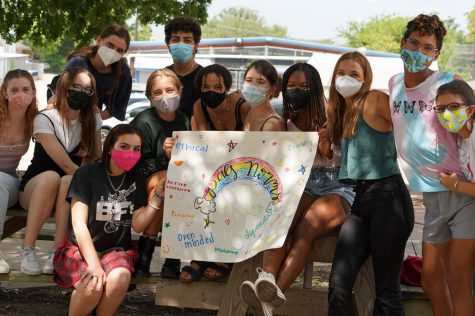
“It’s given me a larger group of people that I get to see and talk to a lot,” Currie said.
Currie’s hectic schedule, however, sometimes prevents him from forming close friendships outside of his extracurriculars.
“It’s kind of hard because sometimes I feel like I’m missing out on those really close relationships of, ‘Let’s have sleepovers all the time, let’s always go and hang out,’ because I’m always doing something,” he said. “I feel like I’m always here, whether it’s school, or an extracurricular involved with school. I wish every once in a while we had a half day, or we would have more days off.”
More rest is not only necessary for students like Currie who are involved in a lot of activities but also for students who just need a break from classwork to clear their mind.
According to Currie, “Even if people aren’t involved [in extracurriculars], a lot of people need mental-health breaks.”
For example, despite doing everything he can to give himself a reasonable schedule, senior Evan Carlson finds himself overwhelmed with school. He takes on-level classes to avoid an excessive workload and does not participate in extracurriculars so that his schedule doesn’t become too busy.
“I go to school for eight hours, I come home, and I always feel like I don’t have enough time to do the things I want to do.” Carlson said. “I can’t effectively manage my time, and I have trouble focusing, so when I’m not at school I don’t get anything done.”

Carlson believes that the school needs to be adjusted into an environment where a wider variety of students can thrive.
“I believe the education system is really flawed,” Carlson said. “For the people that have more difficulty with school, who just don’t really learn in the same way that everyone else does, the system is just not really flexible enough.”
In fact, Carlson’s struggles with school have affected other areas of his life, like his personal well-being.
“School has been stressing me out a lot recently,” Carlson said. “I’m honestly kind of struggling with my mental health right now, and I should probably talk to someone about it in the future.”
Carlson has received support from some of his teachers, particularly Ms. Summerville.
“I am extremely grateful,” Carlson said. “She actually noticed I was struggling, and actually reached out to me and my parents. She was like, ‘What can I do to help?’ I love it when teachers do that.”
Other staff members have also expressed concern over the well-being of students, and offered advice for how to handle academic stress.
I would love to see a complete overhaul of our educational system.
— assistant principal Andy Baxa
“When you see all those assignments you have to do, it’s very overwhelming,” counselor Garcia said. “Everybody just sees eight classes, instead of zoning in on one. Once they start separating, they’re like, ‘OK, this isn’t as bad.’”
Assistant principal Andy Baxa shared a similar message for students who feel overworked.
“When we sit down and we think about every task we’ve gotta do, oftentimes we get overwhelmed and overloaded,” Baxa said. “If we take one task and say, ‘You know what? I can do this,’ and we focus, we finish that task. We feel good that we got something done, we can check it off our list, and then just turn our attention to the next one.” Although Baxa believes that stressful workloads are manageable with the right approach, he also believes that we should be assessing the academic system and curriculum as a whole. “I do not think the pathway we have right now, where we prepare everybody for the college-only path, is really the best for everybody,” Baxa said. “I would love to see a complete overhaul of our educational system.”



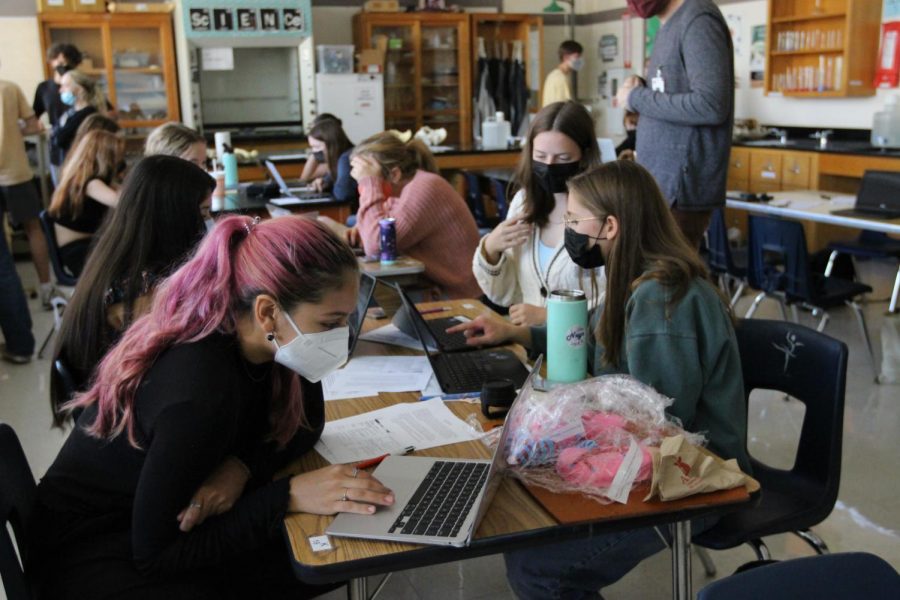

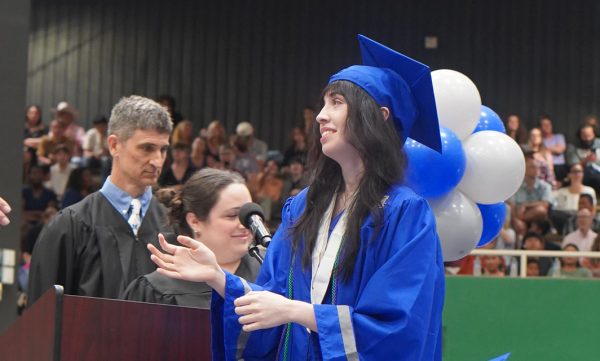
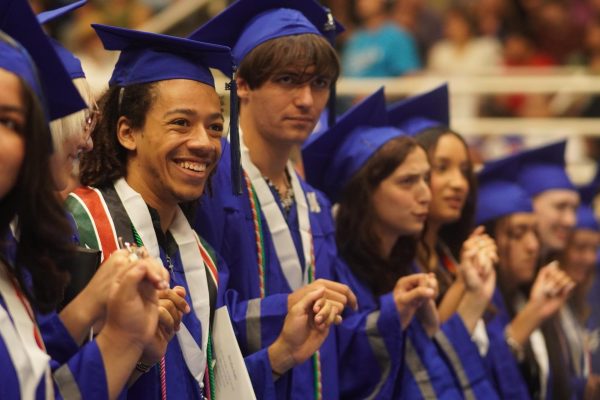
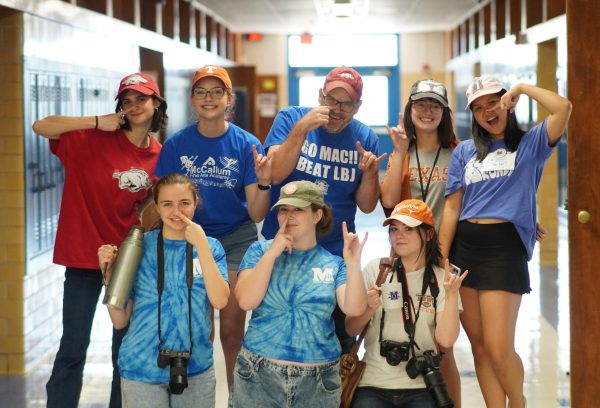

![This is Paul Pews high school graduation photo. The 2023-2024 school year marked his 34th year of teaching. He began his career in Washington, then came to McCallum where he has taught for the past 17. At heart though, he’s really a musician. One that grew up in many different places, including Chicago and California, who took interest in teaching from a young age. His high school choir experience, along with some international singing in college, persuaded him that teaching was his path. He knew he wanted to be able to help create works of art in the fine arts department as well, so he joined McCallum. He’s worked on many of the musicals over the years, even before Joshua Denning, the former theatre director of the fine arts program arrived. Before him was a different director: Tatum.
“I was the music director for all the musicals,” Pew said. “[Mr. Tatum and I] worked very hard, and I just got to the point where I was satisfied with it.” Although he may not be as prominent of a member in the musical theatre community at McCallum anymore, he still plays piano. “I still do a lot of music down at the Music end of the building,” Pew said. Photo courtesy of Paul Pew.](https://macshieldonline.com/wp-content/uploads/2024/07/Paul-Pew-1974-444x600.jpg)
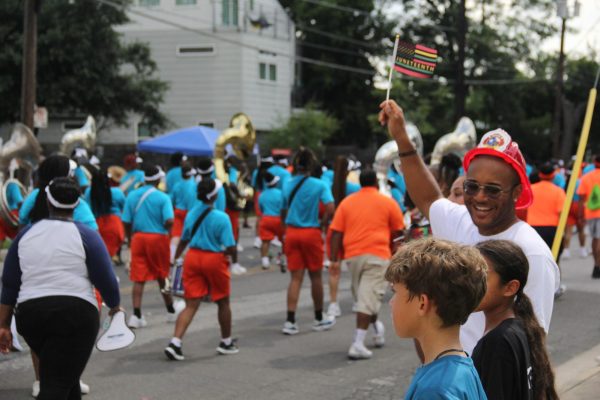
![DANCING QUEEN ONLY 15: The Mccallum quinceañera took place Saturday May 18 in the cafeteria. Students who danced at the quinceañera practiced for weeks during lunch and after school with the help of Señora A to perfect this special moment. “I signed up for fun and for the dress originally, but I actually made a lot of friends, and it helped me want to come back to practice,” said Elizabeth Peables, a freshman quinceñeara. “It’s been stressful, but it always works. We stayed very late yesterday [the day before the event], but today it feels like everything came together.”
Caption by Nellie Eschberger with reporting by Beatrix Lozach.
LA REINA DE BAILE, SOLAMENTE TIENE 15 AÑOS DE EDAD: La Quinceñera de McCallum fue el 18 de Mayo en la cafetería. Estudiantes que bailaron en la quinceañera practicaron por semanas durante el almuerzo y después de la escuela con la ayuda de la Sra. A para perfeccionar este momento especial.
“Originalmente me inscribí para divertirme, y por el vestido, pero actualmente hice muchos amigos y me ayudó a querer regresar a la práctica.” Dijo la estudiante de primer año Elizabeth Peables. “Ha sido muy estresante, pero siempre funciona.” “Nos quedamos muy tarde ayer el día antes del evento pero hoy se siente que todo está cayendo en forma.”
Leyenda por Nellie Eschberger con reportaje de Beatrix Lozach. Traducción por Maverick Palacios.](https://macshieldonline.com/wp-content/uploads/2024/06/53732328578_3ee2526f55_o_53769409497_o-600x338.jpg)


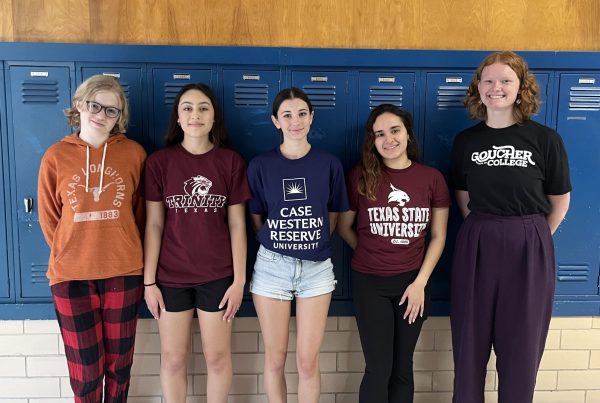

Amy Hufford • Dec 21, 2021 at 9:19 am
Great article! Love seeing a focus on all types of learners.